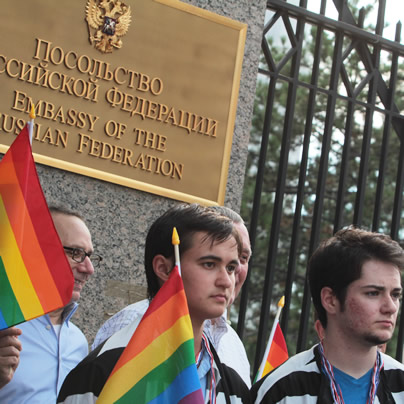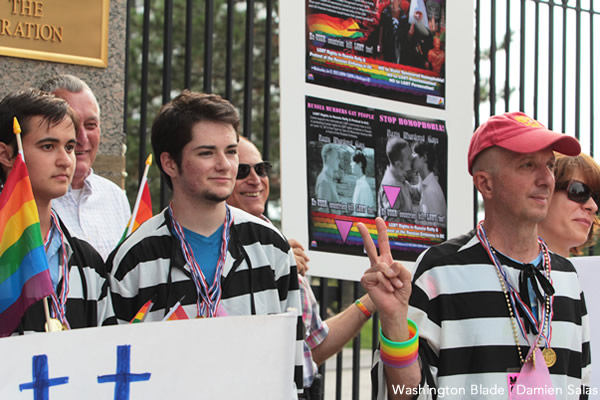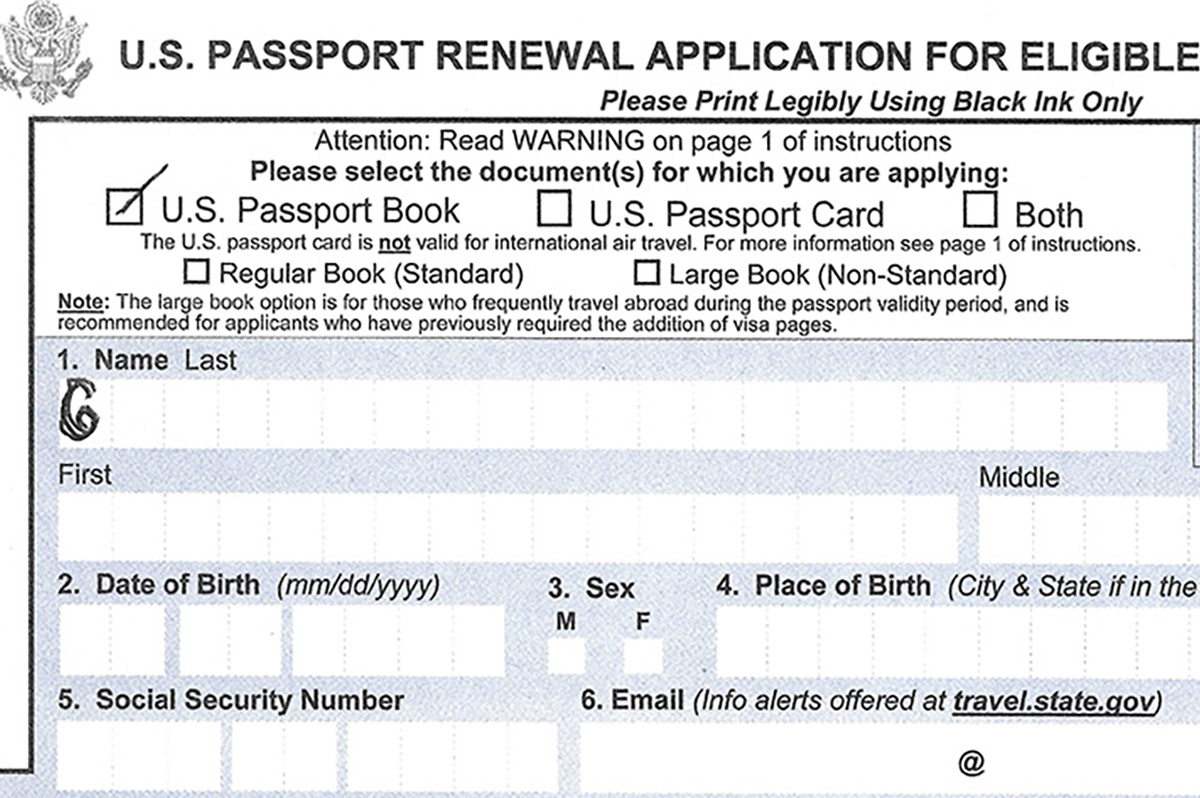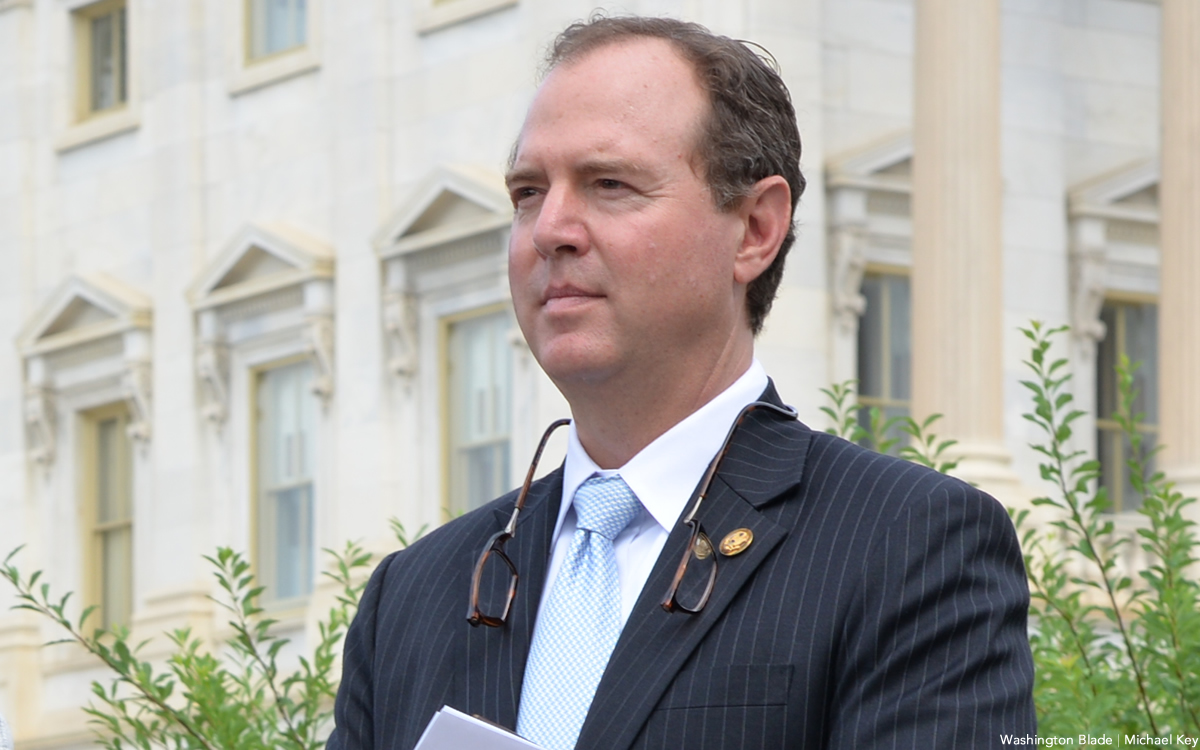National
Obama urged to ban Russians behind LGBT crackdown from U.S.
18 officials’ assets frozen, denied visas under 2012 law


Activists continue to urge the Obama administration to add Russians directly behind their country’s LGBT rights crackdown to the 2012 Magnitsky Act. (Washington Blade photo by Damien Salas)
A growing number of Kremlin critics are urging the Obama administration to use a 2012 law that freezes the assets of Russian citizens and officials directly responsible for human rights violations and bans them from entering the U.S. to punish those behind the country’s ongoing anti-gay crackdown.
Gay journalist Jamie Kirchick and András Simonyi, the former Hungarian Ambassador to the U.S. who is the managing director of Johns Hopkins University’s Center for Transatlantic Relations in D.C., on Dec. 4 urged the White House to use the Magnitsky Act named in honor of the eponymous Russian lawyer who died in a Moscow prison in 2009 after authorities arrested him following his investigation into a $230 million tax fraud scheme. The two men specifically called for the Obama administration to add Yelena Mizulina, the Russian lawmaker who sponsored a bill that bans gay propaganda to minors that President Vladimir Putin signed into law in June, to the list of 18 Russian nationals and officials against whom the Magnitsky Act is already applied.
Kirchick and Simonyi also urged the White House to add Vitaly Milonov, sponsor of St. Petersburg’s 2012 gay propaganda ban, Alexei Trifonov of the Center for Combating Extremism in Nizhny Novgorod and Maxim Martsinkevich of the “Occupy Pedophilia” vigilante group to the list of those banned from entering the United States under the 2012 law.
The deadline to submit the four additional names to the administration was Dec. 14. The White House is expected to announce shortly whether it would add them to the Magnitsky Act.
“Activists in the West have been right to raise alarm bells about the Russian government’s inhumane policies, yet their response to the problem has thus far been scattershot and ineffective,” wrote Kirchick and Simonyi in their Dec. 4 brief. “For those hoping to put a swift end to this ignominious crusade targeting a vulnerable minority, the Magnitsky Act shows a way forward.”
Kirchick and Simonyi further discussed expanding the Magnitsky Act during a panel on Russia’s LGBT rights record that took place at Johns Hopkins University in Northwest Washington on Dec. 6.
Kirchick, who challenged Russia’s LGBT rights record during an interview on the pro-Kremlin television station RT in August before producers took him off the air, discussed calls to boycott the 2014 Winter Olympics that will take place in Sochi, Russia, in February. He questioned those who called for a boycott of Stoli and other Russian vodka brands over the summer.
“There have been very well-intentioned, but in my opinion totally ineffective protests,” said Kirchick. “There already exists a law on the books that is very effective that we can use.”
U.S. Sen. Ben Cardin (D-Md.), who sponsored the Magnitsky Act, backs efforts to expand the list to include Russian officials and individuals directly responsible for the country’s ongoing LGBT rights crackdown.
“The Magnitsky Act can be used against those who violate the human rights of LGBT Russians or anyone else for that matter,” Cardin told the Washington Blade on Tuesday. “The law was written to be inclusive and not limited. We continue to seek ways that it can be broadened further.”
Larry Poltavtsev of Spectrum Human Rights, an organization that promotes global LGBT rights, also supports adding Milonov and others to the Magnitsky Act list. A petition his group launched on Change.org earlier this year in support of the move has more than 12,000 signatures.
“The Magnitsky Law must be applied more liberally to all human rights violators, including LGBT rights violators,” Poltavtsev told the Blade on Tuesday. “It’s the only instrument that we have if we really want to change the situation in Russia.”
Lesbian Russian journalist Masha Gessen noted during Human Rights First’s annual summit in D.C. on Dec. 5 that the Kremlin banned U.S. citizens from adopting Russian children less than a week after Obama signed the Magnitsky Act into law.
“It had a huge psychological and symbolic impact on people in Russia, including LGBT organizations,” she said.
Gessen added Russian LGBT advocacy organizations are “probably not going to speak out in support” of any effort to add additional officials to the Magnitsky Act list. She nevertheless said she supports the proposed travel ban and asset freeze of those behind Russia’s ongoing gay crackdown.
“It needs to be done,” said Gessen. “It also needs to be done because it’s the right thing to do. It’s the right thing to do to send a message to these Russian officials.”
U.S. Federal Courts
Second judge blocks Trump’s anti-trans military ban
Federal courts in D.C. and Washington State have now issued injunctions

The U.S. District Court for the Western District of Washington on Thursday became the second court to issue a nationwide injunction blocking the enforcement of President Donald Trump’s executive order barring transgender people from military service.
The order in Schilling v. Trump from Judge Benjamin Hale Settle comes after Judge Ana Reyes of the U.S. District Court for the District of Columbia blocked implementation of the ban earlier this month in Talbott v. Trump.
Friday was the date by which the Pentagon was to begin identifying and separating transgender service members from the armed forces, per Trump’s executive action.
The lead attorneys in Talbott v. Trump, GLAD Law Senior Director of Transgender and Queer Rights Jennifer Levi and Shannon Minter, legal director of the National Center for Lesbian Rights, shared statements about the injunction in a press release by NCLR.
“Given the thousands of brave and decorated transgender servicemembers facing unthinkable harms as the result of this ban, we are heartened but not surprised by today’s decision,” Levi said. “President Trump’s executive order and Secretary [Pete] Hegseth’s implementation represent a policy that cannot be constitutionally justified. Thousands of transgender servicemembers currently serving have clearly demonstrated they meet all military standards, with many deployed to critical missions worldwide, proving their capabilities beyond question.”
Levi continued, “These dedicated servicemembers and their families have earned our nation’s gratitude and respect, and the government has a responsibility to honor the commitments it has made to them. This is about keeping faith with Americans who have risked everything to defend our freedoms.”
“In both Talbott and Shilling, it was abundantly clear to the court that it must act swiftly to protect our troops from an unconstitutional and indefensible ban that would disrupt the lives and dismantle the careers of thousands of transgender servicemembers and their families,” Minter said. “The harms associated with this ban are gut-wrenching.”
Minter continued, “In each of these cases, the government did not even attempt to claim that any evidence supported its position. There is no reason to discharge individuals who are serving capably and honorably.”
U.S. Federal Courts
Federal judge hears case that challenges Trump passport executive order
State Department no longer issues passports with ‘X’ gender markers

A federal judge in Boston on Tuesday heard oral arguments in a lawsuit against President Donald Trump’s executive order that bans the State Department from issuing passports with “X” gender markers.
Ashton Orr, Zaya Perysian, Sawyer Soe, Chastain Anderson, Drew Hall, Bella Boe, and Reid Solomon-Lane are the plaintiffs in the class action lawsuit the American Civil Liberties Union, the ACLU of Massachusetts, and the private law firm Covington & Burling LPP filed in U.S. District Court for the District of Massachusetts. The lawsuit names Trump and Secretary of State Marco Rubio as defendants.
Former Secretary of State Antony Blinken in June 2021 announced the State Department would begin to issue gender-neutral passports and documents for American citizens who were born overseas.
Dana Zzyym, an intersex U.S. Navy veteran who identifies as nonbinary, in 2015 filed a federal lawsuit against the State Department after it denied their application for a passport with an “X” gender marker. Zzyym in October 2021 received the first gender-neutral American passport.
The State Department policy took effect on April 11, 2022.
Trump signed the executive order that overturned it shortly after he took office. Rubio later directed State Department personnel to “suspend any application requesting an ‘X’ sex marker and do not take any further action pending additional guidance from the department.”
“Even before Donald Trump was inaugurated, it was clear to me he wanted to control the lives and identities of transgender people like myself,” said Orr, a transgender man who lives in West Virginia, in a press release the ACLU released before U.S. District Judge Julia Kobick heard the case. “Like many others, I rushed to update my passport hoping I could get an accurate version. Now, the State Department has suspended my application and withheld all my documents from me, including my passport, my birth certificate, and even my marriage license.”
Li Nowlin-Sohl, a staff attorney for the ACLU’s LGBTQ and HIV Project, described the Trump-Vance administration’s passport policy as “openly discriminatory and animated by a transparent desire to drive transgender people out of public life altogether.”
Germany, Denmark, Finland, and the Netherlands are among the countries that have issued travel advisories for trans and nonbinary people who plan to visit the U.S.
WorldPride is scheduled to take place in D.C. from May 17-June 8. InterPride, the organization that coordinates WorldPride events, on March 12 issued its own travel advisory for trans and nonbinary people who want to travel to the U.S.
It is unclear when Kobick will issue her ruling.
Federal Government
Trump ‘culture war’ complicates HUD’s distribution of $3.6B in housing grants
Senate Dems call for new agreements

The disbursement of more than $3.6 billion in federal grants to housing providers has been paused for weeks while the U.S. Department of Housing and Urban Development seeks to condition receipt of the funding on compliance with President Donald Trump’s executive actions targeting DEI and transgender and immigrant communities.
March 4 was the statutory deadline for the agency to distribute the funds, which come through the Continuum of Care Program in support of local governments and nonprofit organizations working to promote “a community-wide commitment to the goal of ending homelessness.”
On March 13, a group of Senate Democrats led by U.S. Sens. Adam Schiff (Calif.) and Tina Smith (Minn.) wrote to HUD Secretary Scott Turner urging him to move quickly on distributing the grants and warning of the consequences that recipients are now facing and the harm they will encounter in the future if delays persist.
“To keep the lights on, providers are now being forced to draw on lines of credit at significant cost and risk to their organizations,” the senators said. “These projects enable homeless service providers to help veterans, families with children, youth, seniors, and vulnerable individuals access permanent and temporary housing, crisis counseling, and other supportive services.”
HUD subsequently disseminated grant agreements — and Schiff published an example on his office’s website — that included, among other provisions, language stipulating that the awardee (1) “shall not use grant funds to promote ‘gender ideology,’ as defined in E.O. 14168, Defending Women from Gender Ideology Extremism and Restoring Biological Truth to the Federal Government,” (2) certifies that it does not operate any programs promoting diversity, equity, and inclusion that violate any applicable Federal anti-discrimination laws, and (3) agrees not to use “that funding in a manner that by design or effect facilitates the subsidization or promotion of illegal immigration or abets so-called ‘sanctuary’ policies that seek to shield illegal aliens from deportation.”
On March 14, the 4th U.S. Court of Appeals stayed a nationwide injunction enjoining three parts of Trump’s executive order on DEI, and the following day, HUD rescinded the CoC contracts and said to expect new agreements within a week as the agency was “working to revise its CoC grant agreements to be consistent with Federal law and compliant with applicable court orders.”
Schiff then led a second letter to Turner on March 19 with the Senate Democratic Leader Chuck Schumer (N.Y.) and U.S. Sens. Alex Padilla (D-Calif.), Martin Heinrich (D-N.M.), Ron Wyden (D-Ore.), Mazie Hirono (D- Hawaii), and Richard Blumenthal (Conn.).
“We urge the department to immediately issue new CoC grant agreements consistent with longstanding practice— free of the aforementioned conditions— to ensure all individuals experiencing homelessness receive protection and support, regardless of gender identity, location, or other characteristics,” they said, requesting a response by March 31.
“The initial FY2024 grant agreements issued to CoC funding recipients contained new requirements that are deeply problematic, and likely unlawful, requirements,” the senators argued. “These mandates, such as barring shelters from serving transgender people, prohibiting DEI initiatives, and certifying that they do not support ‘sanctuary’ policies protecting noncitizens, conflict with federal civil rights, fair housing, and immigration laws, raising serious legal and constitutional concerns.”
The lawmakers noted “the harm caused by these delayed and unfulfilled CoC grant agreements will fall disproportionately on our most vulnerable populations, including women, families with children, youth, veterans, survivors of domestic and intimate partner violence, people with disabilities, and LGBTQ+ individuals.” They added, “Women experiencing homelessness — many of whom are fleeing domestic abuse — already face significant barriers to safety and stability, and restricting access to critical housing services will only further endanger their lives and well-being.”
Citing research that nearly one in three transgender Americans has experiences homelessness in their lives, Schiff and his colleagues stressed that “Transgender and nonbinary people in the U.S. face significant barriers to securing safe housing, with many experiencing homelessness and high rates of mistreatment and violence in shelters.”
With respect to the language in the agreements about “sanctuary” policies, the senators wrote “The organizations receiving CoC funds exist to provide critical, non-discriminatory aid to those in need, regardless of their immigration status. These organizations do not set or enforce immigration policy — they simply fulfill their legal duty to provide life-saving and life-changing care.”
Later on March 19, HUD began issuing new contracts that did not contain the provision concerning DEI but did include the same language about “gender ideology” and “sanctuary” policies.
-

 Opinions4 days ago
Opinions4 days agoFinding the courage to flee U.S. to save my trans daughter
-

 District of Columbia4 days ago
District of Columbia4 days agoFirst D.C. LGBTQ seniors home ready to open
-

 District of Columbia5 days ago
District of Columbia5 days agoD.C. queer bar owners sound alarm on WorldPride security concerns
-

 Sponsored5 days ago
Sponsored5 days agoExploring the world of 99Bitcoins and the impact of Telegram Bots on cryptocurrency education












